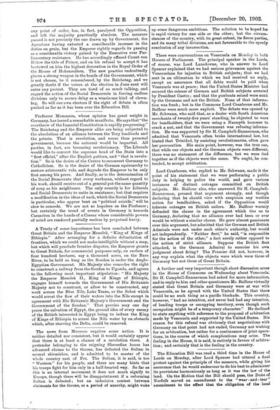Lord Cranborne, who replied to Mr. Schwann, made it the
point of his statement that we were performing a public duty in helping to police the world, and gave various instances of distinct outrages committed on British subjects. Mr. Balfour also, who answered Sir H. Campbell- Bannerman, pressed that argument strongly, and though declaring that he should view with suspicion any warlike action for bondholders, asked if the .Opposition would tolerate outrages on British sailors. Mr. Balfour warmly defended the clause in the agreement which ties us to Germany, declaring that no alliance ever had been or ever would be without a similar clause. He grew almost passionate over this argument, but admitted that the German and British Admirals were not under each other's authority, but would act independently. " Neither fleet," he said, " is responsible for the action of the other," a fact surely rather opposed to the notion of strict alliance. Suppose the British fleet attacked, is the German Admiral to exercise his own judgment about firing? The Premier did not, however, in any way explain what the objects were which were those of Germany but not those of Great Britain.










































 Previous page
Previous page